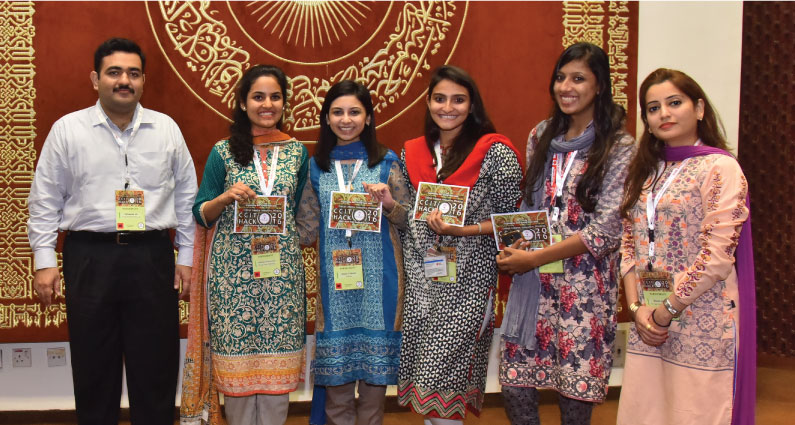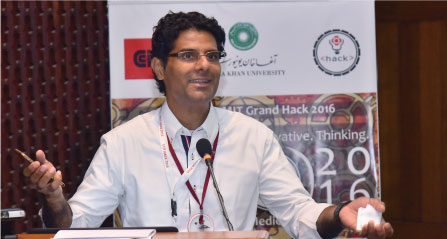When Hacking Can Improve Lives (part II) by Muhammad Altamash (guest writer)
Innovative app wins top prize at AKU’s first-ever Hackathon

Four innovative solutions in emergency medicine receive awards
Innovators at Pakistan’s first-ever medical hackathon at the Aga Khan University have proposed new ways of tackling challenges facing Pakistan’s emergency rooms (ER).

HistorER, the winning team at the Hackathon, came up with a unique QR (quick response) code system to address a persistent challenge faced by ER doctors. Patients are often brought to emergency by family members or by bystanders who are not aware of their medical history. In the absence of critical information, doctors face delays in performing life-saving procedures.
The HistorER team has suggested that every person carry a medical card with a QR code with vital details: blood group, allergies, current medication and previous operations. Scanned, the QR code would provide doctors immediate access to information and the ability to initiate treatment promptly.
Speaking about the winning team’s solution, the lead organiser of the event, Dr Asad Mian, Associate Professor at the Department of Emergency Medicine at AKU, said: “HistorER’s idea can improve the efficiency of the ER and reduce errors caused by doctors not having timely access to vital patient data. Since the team’s solution involves their own storage and retrieval system, they can also ensure the safety of patient records and facilitate information sharing between doctors at different hospitals."
Besides the winning team, three other groups also received prizes and awards:
- JackED which developed a convenient, prototype ER gown or ‘JackED’ to boost the accuracy of ECGs, a test to determine whether a heart attack has taken place.
- TrICS who created an app enabling ambulance paramedics to relay vital data about critically ill patients to ER staff before they arrive at the hospital.
- Breath Hacks which developed a mechanical Ambu Bag device to provide emergency breathing assistance to patients waiting for a ventilator.
All pitches at the event were scored by a panel of healthcare, entrepreneurship and innovation experts in line with four criteria: health impact, innovation, business model, and presentation skills.
Pakistan Innovation Foundation founder Athar Osama, one of the judges at the event, said: “Innovation within a society comes from the bottom up – it is the work of individuals who, who faced with constraints, take it upon themselves to find solutions. Emergency response is a very critical area for a volatile city like Karachi and I’ve seen some great ideas at the Hackathon that are sorely needed. The participants have made great progress in just a few days and I look forward to seeing how they build upon these ideas.”
Eighty participants, worked over three days, assisted by 20 mentors with a background in entrepreneurship. Participants from fields as diverse as medicine, information technology, business and engineering collaborated to find innovative ways to improve patient safety, boost the productivity of physicians and reduce treatment time.
Speaking about the need for innovation in the healthcare sector, Aga Khan University Hospital CEO Hans Kedzierski said: “Hackathons are one of the most vibrant ways to create innovative solutions. The 11 teams had just two days to tackle complicated problems. Even then we found it so difficult to decide the most innovative solution. However, the intelligent use of technology to boost patient safety meant that we choose HistorER.
“I’d like to congratulate all the teams on their hard work. It is great to see young people working hard to create a better healthcare system for Pakistan.”
Besides Athar Osama, judges at the event included Dr Munawar Khursheed, Assistant Professor at AKU, Rumman Ahmed, entrepreneur and creativity consultant, Dr Talha Rehman, Operations Manager at the Elaj Trust, Hans Kedzierski, AKUH CEO, and Khairunnisa Hooda, Head of the 24/7 Emergency and Acute Care Service Line at AKUH.
A host of international speakers and local experts delivered inspirational speeches during the event to help guide the teams at the Hackathon. The speakers included Firoz Rasul, AKU President, Dr Junaid Razzak, healthcare policy expert and serial entrepreneur, Dr Farhat Abbas, Dean of the Medical College at AKU, Dr Ayesha Khalid, one of the organisers of MIT’s Hacking Medicine event, and Hans Kedzierski, AKUH CEO.
Supported by the Department of Emergency Medicine, AKU, and the 24/7 Emergency and Acute Care Service Line, AKUH, the event was organised by the Critical Creative Innovative Thinking forum which is an educational, training and research programme seeking to foster creativity and innovation in biomedicine and healthcare.
[from Health & Disease]
About the Author: Muhammad Altamash is with the Dept. of Public Affairs at the Aga Khan University.
Acknowledgment: This article was first published on the AKU website.
Editorial Note: Copyright belongs to the author. You may read more about the MIT Grand Hack 2016 here.



After installing PK Medi’s Pharmacy Automation Solutions, our prescription filling errors reduced drastically. It’s fast, efficient, and safe.
ReplyDeleteFor More Details: https://pkmec.com/
The Innovation Hackathon at Where U Elevate transforms learning into a hands-on experience. It’s inspiring to see students grow while building real solutions.
ReplyDelete